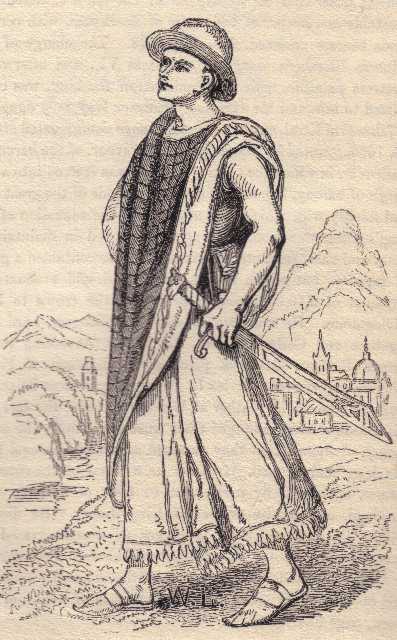LITHGOW, WILLIAM,
a celebrated pedestrian traveller, was born in the parish of Lanark,
of poor parents, in 1583. Having an irresistible desire to see
foreign countries, and possessing a restless and adventurous
disposition, about 1607 he first set out on an expedition through
Germany, Bohemia, Helvetia, and the Low Countries, and, arriving at
Paris, remained there for ten months. In March 1609 he proceeded
from the French capital to Rome, whence he went to Naples, Ancona,
and Venice, and, after visiting the various islands in the
Mediterranean, wandered through Greece and Asia, meeting on his way
with various strange adventures, and being exposed to many perils
and hardships. All his journeys were performed on foot, and it would
seem that he was often obliged to trust to chance for means to
defray his expenses on the road. He was, however, generally lucky
enough to obtain a supply of money at the very time he most required
it. On one occasion he met with two Venetian gentlemen who
entertained him hospitably for ten days, and at parting made him a
present of fifty zechins in gold. At another time he happened to
journey from Jerusalem to Grand Cairo with three Dutchmen, who all
drank themselves to death with “strong Cyprus wine,” and the last of
them who died bequeathed their collected property to our fortunate
traveller. Upon a third occasion, while passing through Calabria, he
found the bodies of two young noblemen in a field who had killed
each other in a duel, when he made himself master of their purses
and all the valuables on their persons. He afterwards visited
Africa, traversing Barbary, Morocco, Algiers, Tunis, and Tripoli;
then crossing over to Italy, he proceeded through Hungary, Germany,
and Poland, and embarked at Dantzic for London. In 1619 he travelled
through Portugal and Spain, and finally arrived at Malaga, where he
was arrested as a spy, and, after being put to the torture, was
handed over to the Inquisition, by which he was treated with so much
renewed cruelty, as to be deprived of the use of his limbs, and his
body was reduced to “a martyred anatomy.” On regaining his liberty,
he returned to London, in 1621, and soon after was carried to the
king’s palace at Theobald’s on a feather-bed, and exhibited to King
James and all his court in that condition. His majesty ordered him
to be taken care of, and was twice at the expense of sending him to
Bath. A portrait of Lithgow in his Turkish habit is subjoined;

[portrait of William Lithgow]
By the king’s command Lithgow applied to Gondomar, the ambassador
from Spain to the English court, for the restitution of the property
of which he had been deprived at Malaga; and for some compensation
for his unmerited sufferings. The Spanish minister promised him full
reparation, but never kept his word. Lithgow, in consequence,
upbraided him in the presence-chamber, before several courtiers,
with breach of promise, and even went so far as to commit an assault
upon him “with his fist;” for which he was sent to the Marshalsea,
where he continued a prisoner for nine months. In 1627 he returned
to Scotland, where he died about 1640.
His Travels were first published in 1614. At the conclusion of
the eighth edition, he informs us that “in his three voyages his
painful feet have traced over, besides passages of seas and rivers,
thirty-six thousand and odd miles, which draweth near to twice the
circumference of the whole earth.” He also wrote an Account of the
Siege of Breda, which appeared in 1637. An abridgment of his Travels
and Sufferings is printed in Morgan’s Phoenix Britannicus.

